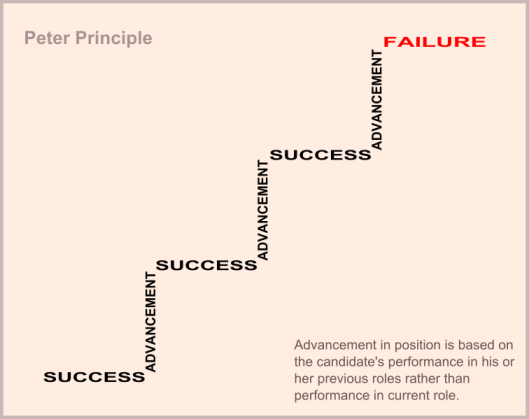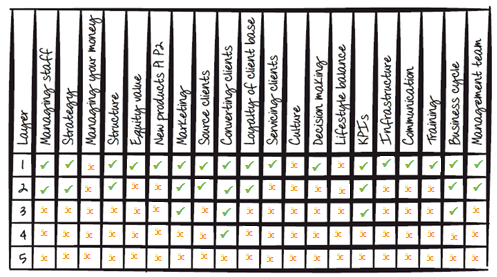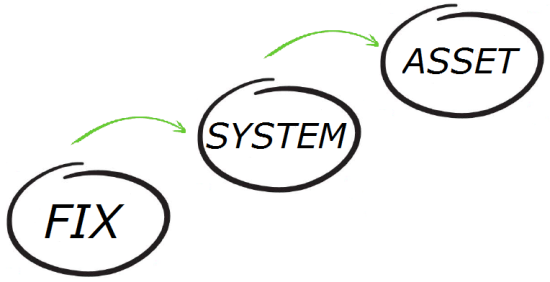If it’s one thing worse than reporting to an incompetent manager, it’s being a manager and constantly feeling you’re inadequate. So why do useless people win promotions, and how do you make sure you’re not one of them?
One of my favourite management philosophies, The Peter Principle, observes that “managers rise to the level of their incompetence.” Laid out, as in this diagram, success in one role is followed by a promotion, future success and subsequent management promotions, until an individual is promoted into a role just beyond their abilities.

Because successful people are rarely overlooked for promotion, the management layers of large corporations are littered with these Peters who have been promoted once too often: they are managing at the level of their incompetence. [1] Reporting to a useless manager? Chances are they used to do your job really well, and should have stayed there.
Scott Adams came along and upended this philosophy with The Dilbert Principle. He observed that these promotions weren’t success pushed too far – on the contrary, large organisations intentionally pushed incompetent people into management to limit the damage they could cause if they had actual responsibilities! “The least competent, least smart people are promoted, simply because they’re the ones you don’t want doing actual work.” Reporting to a useless manager? Chances are they used to be useless in your job, so were moved upward to get out of your way.
Both Principles are humorous ways of addressing the real phenomenon of incompetent managers. So what if you feel that you’re the incompetent one, promoted beyond your expertise? (Noting this could be, vis Peter, because of your incredible talent or, vis Dilbert, because of your complete lack thereof.) Relax, we have a name for this too: The Imposter Syndrome.
The Imposter Syndrome
Boringly defined as “an inability to internalize your accomplishments”, the Imposter Syndrome is well-named: you find yourself in a position of success (money, responsibility, accolades, authority) and believe you are an Imposter, masquerading as competent. You believe others have misjudged you, the ‘truth’ will be revealed, and this will all come crumbling down.
The Imposter Syndrome is ridiculously common, and a dreadful waste on business productivity and personal health. Studies show its prevalence in highly successful women and it’s a frequent concern in the highly successful (and overly masculine) Hacker News crowd.
Dealing with Imposter Syndrome Yourself
We’re going to address these in regards to a business system solution, so let me get this out of the way for those wanting to know how to deal with Imposter Syndrome: you have reached this level of success because someone else believed in you. Maybe they were a manager. Maybe they were a customer. Almost certainly, they knew what they were doing. You may not be perfect, nobody is, and you may have been given this opportunity as a chance to grow into your abilities as much as to use your existing ones. If you fall down, get up. If you fail horribly (you will, but it won’t be as horrible as you think) then that will be as valuable to you as the failures that have guided presidents and billionaires. The only thing you need to deal with is believing in yourself. Because right now you don’t – and that flies in the face of so much evidence, because you are choosing only to see the evidence of Imposter.
Want something more specific than a pep talk? Buy a journal (exercise book, whatever). Every time you doubt yourself, write down that fear on a new page. And every time you do something good, write it in the book as evidence against those fears. Once a day, or every 5 minutes, doesn’t matter, just write it down. Tell your colleagues it’s part of a management course, whatever, just write it down. That book is evidence that you have every right to be right where you are – for every new page of fear, you will find lines and lines of evidence countering it.
My experience with the Peter Principle
Before I became a business coach, I worked as the State Operations Manager for a large real estate franchise. One of the managers on my team had been a wonderfully successful sales agent – and when they grew tired of that career, the CEO offered them a training and mentoring role. Let’s be blunt – it was not a successful initiative.
But what let the business down was not the manager’s abilities. It was the business which had recruited them for the wrong reasons, into a poorly defined management role with no training or support. The business was unable to say “Here are the competencies required for this role. And noting you lack some of them, here is the training plan to help you develop them.”
They also, and this is incredibly common, painted a picture that a Head Office role was “better” and “more valuable” than the sales agents. Unintentionally in their case, but in most large organisations “manager” is seen as better than “worker bee”, is rewarded better, and as a result every worker bee wants to climb the slippery management pole [2] [3].
My experience with The Imposter Syndrome
This needs me to blow my own trumpet a little: Shirlaws Group, my [2016 Edit: former] coaching business, has been called the Real Madrid of business coaching – where the best players want to play. Stats from my time in the UK showed we recruited (and this is for many reasons) just 1 in 200 applicants. Most of my colleagues have grown or sold their own businesses or been CEOs of multi-nationals, and bring decades of experience to the team.
I joined when I was 24. I remain the youngest person to have been offered equity partnership in Shirlaws Australia. And I need to share all of that so you appreciate how I felt, nearly 10 years ago, about whether maybe, just perhaps, I had completely hoodwinked this global success story into letting me in the door.
Two things made all the difference, and only one is scalable (I had a lot of grey hair by 24, so passed for a lot older.) The Shirlaws Induction Program runs for 18 months. It combines classroom and onsite training, plus mentoring and coaching. (And these days, since I joined 9 years ago, scores of support documents and hundreds of hours of video tutorials.) And it’s all structured in the same simple framework we use with our business clients: Capability

So when I became a business coach, arguably a career promotion above my level of competence, I was told: “Here is the 100 point Capability Matrix that measures your skills. And here is the training program to get you to 40 points quickly.”
Then “Here is the 50 point checklist for building a coaching business. You will work with your team to advance through those.”
See how that was different to the Real Estate ‘Peter’ I worked with?
How to avoid Peter, Dilbert, and Imaginary Imposters
I discussed the Capability Matrix in more detail in this article. It’s transferable into any business for the ownership and leadership levels [2020 Edit: While Shirlaws Australia no longer exists, the concept of a clear, strategic system that you can implement is reflected in my new online course program.]
For managers and worker bees at lower levels, the same 5 Layers applies but you’ll need to personalise the technical headings to match your business. I’ve done this, and the consequent Training Needs Analysis and Training Program, with industries from Town Planning to Real Estate to Fencing, so I know it works.
Then, and lastly, you need to implement this framework ‘Relative to Self‘.
As I so eloquently stated when I slammed The SWOT Analysis, “I’m a very poor runner compared to Usain Bolt … but I would kick Stephen Hawking’s ass over any distance you choose. So is my running a Weakness or a Strength?”
There’s no value comparing your new managers to Sheryl Sandberg, any more than there’s value comparing them to a 12-year-old fry cook at McDonalds.
Take the time (and if you don’t have the time, take the coaching) to decide for your business:
- What does competency in this management role look like? Remember, you’re measuring the range of skills and the required depth of understanding in each skill.
- Are they all general business abilities, or are there industry / business specific capabilities?
- Are we recruiting someone with those skills, or are we willing to train them?
- How does this candidate score against the required skills?
Then framework allows you to communicate your decision to recruit, or not, clearly[4]. It gives your manager a tool to understand both their own skills, and where they can improve either to meet this role’s requirements or to build their general business capability. And it guides their performance development, either a general training program, a fast-tracked induction, or through your coaching and mentoring.
With this system in place, both you and they will know for sure whether they’re a misplaced Peter or a perfectly placed, not-at-all pretending, asset to your team.
If you leave me, can I come too…? Click here to subscribe to my infrequent updates
If you’re Dustin Curtis, you should follow me on Twitter here.
And please tell your friends: Sharing is Caring
[1] It’s actually named after its observer, Laurence Peter. The fact I always thought it used “Peter” to mean “a common, incompetent individual” (like we say “average Joe”) may mean Laurence leveraged competence in human behaviour to secure a promotion into branding the phenomenon, proving his own principle by naming his success and becoming the eponymous definition of uselessness.
[2] The fact bees have wings so don’t need to climb anything speaks to how ingrained this is. Many of the best, or at least most observant, simple buzz off somewhere else.
[3] A sentiment I’ve seen in a few places, including Derek Gatehouse’s book The Perfect SalesForce, is that a Sales Manager should be paid more than the average Salesperson on their team, but less than the best. It’s a different position with differing requirements, and you don’t want the team viewing management as career progression – that’s the best way to simultaneously lose your best rep and hire a dud manager.
[4] In the interests of space, I haven’t explored the concept of ‘Family Photo Fit’, or the necessary Cultural Match you must insist on when recruiting or promoting. Skills are just 1 of the 3 areas I recommend applying when recruiting, the other 2 being Culture and Relationships (ie, do they need to bring specific networks).






[…] https://jacobaldridge.com/business/the-peter-principle-dilbert-principle-and-imposter-syndrome […]